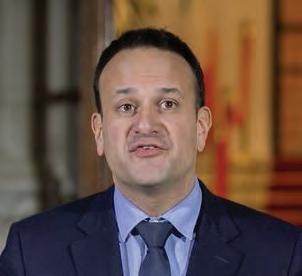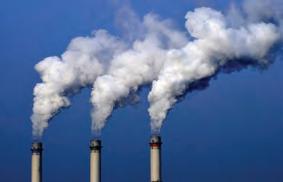
16 minute read
News Update
news update
Advertisement
Chancellor boosts green homes
UK homeowners will receive vouchers of up to £5,000 for energysaving home improvements, the chancellor has announced.
Rishi Sunak has set out a £2bn grant scheme in England for projects such as insulation as part of a wider £3bn plan to cut carbon emissions. The Treasury said the grants could help to support more than 100,000 jobs.
Under the Green Homes Grant, the government will pay at least two-thirds of the cost of home improvements that save energy, the Treasury said.
The scheme will launch in September, with online applications for recommended energy efficiency measures, along with details of accredited local suppliers.
Once one of these suppliers has provided a quote and the work is approved, the voucher is issued.
Speaking to BBC Breakfast, Business Secretary Alok Sharma added that the poorest households could receive up to £10,000 towards costs, and that double glazing would also be covered by the scheme.
He continued: “What [the scheme] ultimately means is lower bills for households, hundreds of pounds off energy bills every year, it’s supporting jobs and is very good news for the environment.”
The government said about half of the fund - which is due to be spent in one financial year - will go to the poorest homeowners, who will not have to contribute anything to the cost. Better insulation could save some people £600 a year on energy bills, the Treasury said.
Sunak said the investment would also help to “kick-start our economy” by creating thousands of jobs and providing business for existing skilled workers, as the UK recovers from the economic shock of coronavirus.
“As Britain recovers from the outbreak, it’s vital we do everything in our power to support and protect livelihoods across the nation,” he said.
The grants are part of a wider £3bn “green investment” package due to be announced in the chancellor’s summer statement, to support efforts to rebuild the economy after the pandemic.
The plan aims to create tens of thousands of new jobs while helping the UK meet its 2050 target of achieving net zero carbon emissions.
COMMISSION OUTLINES POLICY ACTION
Strategies for ‘urgent global action’
The high-level global commission created to examine “new and stronger policy action” for energy efficiency (see EiBI Oct 2019) has published its conclusions. Chaired by (now former) Irish Prime Minister Leo Varadkar (right), it has presented the International Energy Agency with twelve specific strategies for urgent global action.
For each of the policies, Varadkar provides an overview of what is needed to realise that particular strategy: • net zero-energy, water, waste and carbon buildings and homes are an increasing trend in regulations for new buildings, but these cannot happen without proper support and building code updates; • home and building retrofits are very important, since most homes and commercial buildings that will be standing in 2050 have already been built; • cooling is the fastest-growing end use in buildings as its energy demand more than tripled between 1990 and 2018; • smart buildings and homes. Sensors, automated controls, and other smart software can optimise
energy use; • in regions with substantial space and water heating loads, electrification of space and water heating can often reduce both energy use and emissions; • appliance and equipment standards deliver large savings. These standards should be regularly updated and other countries should follow suit; • industrial efficiency. Overall manufacturing energy intensity could improve by 44 per cent between now and 2040 with 70 per cent of the energy savings potential in less energy-intensive manufacturing sectors; • vehicles have substantially increased in energy efficiency in recent years, driven primarily by ambitious fuel economy standards; • reducing vehicle distance travelled; • the freight sector can save energy through mode switching, providing seamless transitions among various modes as well as the digitisation of logistics; • aviation efficiency and longdistance travel. In aviation, improved engines, operational efficiency by air traffic control, airlines and pilots, and reductions in the amount of travel can cut aviation energy use and emissions by about 50 per cent; and • new electric grid technologies can reduce power losses in the grid via better grid design, smart metering, integration of demand-side management and demand-response interventions and theft prevention efforts can further reduce large losses.
The IEA, which regularly describes energy efficiency as “the first fuel”, has pledged to ensure that each government is consistently alerted to these twelve priorities.
Landlord aims to transform property portfolio
Property giant British Land is to transform the entire portfolio of its estate to net zero carbon – including developments – by 2030.
The company, which manages a property portfolio worth £14.8bn, will create a Transition Fund to drive operational progress and finance the retrofitting of the standing portfolio. It has also committed to roll-out the successful place-based approach to social contribution across the portfolio.
As part of the drive to a net-zero carbon portfolio – including development activity by 2030 – British Land will aim for a 50 per cent reduction target in embodied carbon and a further 75 per cent reduction in operational carbon intensity against new 2019 baselines. In addition, from this year all developments delivered to be net zero embodied carbon.
The company intends to prioritise retrofit over new build by means of a bespoke Transition Fund resourced by an internal fee of £60 per tonne of carbon, levied on new developments
Claimed to be the first of its kind, the fund will accelerate the path to net zero by driving innovation in development, financing the retrofit of the standing portfolio, and supporting customers in transforming their own space to reduce emissions

The strategy follows the conclusion of a successful fiveyear programme for British Land, achieving a 55 per cent reduction in energy intensity and 73 per cent reduction in carbon intensity versus its 2009 baselines, in addition to a 16 per cent reduction in embodied carbon emissions.
news update
URGENT STEPS NEEDED FOR POST-COVID-19 RECOVERY
CCC details investment priorities
In its latest Annual Report to Parliament, the Committee on Climate Change (CCC) has for the first time set out recommendations to each government department detailing what will be required from them to achieve a net-zero carbon society by 2050.
This details the urgent steps that must be taken in the months ahead to initiate a green, resilient COVID-19 recovery, to be delivered through strong coordination across Whitehall. “Doing so will propel the UK towards more rapid climate progress and position the country as an international climate leader ahead of the pivotal COP26 climate summit in Glasgow next year,” states the CCC.
The Committee’s new analysis highlights five clear investment priorities in the months ahead. The majority of these emphasise heavily the role of energy efficiency, particularly in buildings.
Above all, the CCC is seeking “lowcarbon retrofits and buildings that Almost half of the UK’s electricity was supplied by renewables in the first three months of this year, according figures from the Department for Business, Energy and Industrial Strategy.
Renewables generated 47 per cent of the UK’s electricity from January to March, beating the previous record of 38.9 per cent set in the third quarter of 2019. The Government said this was mostly due to increased capacity and higher wind speeds in February.
Wind generated 30 per cent of

are fit for the future.” There are “vital new employment and re-skilling opportunities across the country, if Government supports a national plan to renovate buildings and construct new housing to the highest standards of energy and water efficiency, to begin the shift to low-carbon heating systems.”
The Committee proposes a “rollout of ‘green passports’ for buildings and local area energy plans to begin immediately.” A ‘green passport’ is a digital passport providing detailed guidance on the actions required – and already undertaken – to improve a building’s energy efficiency and the UK’s power in Q1 (14.7 per cent from onshore wind, 15.2 per cent from offshore), beating the previous record of 22.3 per cent set in Q4 of 2019. When other low-carbon forms of generation, including biomass and nuclear, are added, the proportion rises to 62.1 per cent, up from the previous record of 51.8 per cent.
Renewable electricity generation was a record 40.8TWh in Q1, beating the previous record of 32.5TWh set in Q4 2019. Wind generated 26TWh, outperforming the previous high comfort, based on building fabric and operational data.
“The CCC sees a role for these passports to include recommendations on low carbon heat alongside this, and for the platform to be expanded to cover issues such as indoor air quality, flood resilience, water efficiency and overheating.” Passports would be transferable between building owners and help to maintain sight of long-term decarbonisation/ resilience goals. They would capture Energy Performance Certificate data digitally, and augment it with other data over time.
Chairman Lord Deben (above), the former Conservative environment secretary, stated that “in the immediate term, bringing forward funding for renovating public sector buildings can set an important standard and cut public energy bills. Targeted support for SMEs to improve energy efficiency can help boost
‘Progressive’ nations still lag in emissions cuts
New research, focusing on the UK and Sweden, demonstrates just how far even ‘climate progressive’ nations are from meeting our international commitments to avoid dangerous climate change. The researchers from the University of Manchester concluded that despite the UK and Sweden claiming to have world-leading climate legislation, their planned reductions in emissions will still be two to three times greater than their fair share of a Paris-compliant global carbon budget.
The annual rate that emissions are expected to be cut is less than half of that required, with the scientists suggesting a minimum for the UK of 10 per cent each year, starting in 2020. Similarly, the date of achieving a fully zero-carbon energy system should be around 2035, rather than the UK’s current ‘net-zero’ by 2050 legislation.
The study, led by Professor Kevin Anderson (pictured) from The University of Manchester, is published in the journal Climate Policy. The team of climate scientists asked how close these countries are to meeting the UN’s climate commitments if the ‘safe’ quantity of emissions, the global carbon budget, is shared fairly between ‘developing’ and ‘developed’ countries.
Prof. Anderson, concludes: “Academics have done an excellent job in understanding and communicating climate science, but the same cannot be said in relation to reducing emissions.”
Renewables hit new record high in winter period
productivity.” of 19.4TWh in Q4 2019. Onshore wind provided 12.8TWh, beating 9.8TWh set in Q1 2019, offshore wind provided 13.2TWh, beating 10.2TWh in Q4 2019.
Low carbon generation (renewables and nuclear) reached a record high at 62.1 per cent, with fossil fuel generation reaching a record low at 35.4 per cent with a sharp fall in gas generation. BEIS noted that this was achieved despite a fall in nuclear generation caused by maintenance outages.
IN BRIEF
PV potential for London borough
A south London council has identified 40,000 sites as suitable for photovoltaic panels as it works towards a carbon neutral goal in 2030.
Energeo, a specialist provider of data that helps organisations accelerate decarbonisation, has analysed the built environment across the London Borough of Lambeth to enable the council to prioritise its investment in sites for solar PV.
Energeo’s data has given Lambeth Council an accurate visualisation of where it can most effectively deploy solar. The council is one of hundreds in the UK to have declared a climate emergency. Plans for Hants waste to energy
Veolia has submitted its planning application for an Advanced Energy Recovery Facility near Alton, which will save 65,000 tonnes of carbon emissions a year compared with sending the waste to landfill. This is part of an overall strategy in the area to recycle more and recover more energy from waste.
This planning application is for a state of the art advanced technology which will utilise non recyclable ‘residual’ waste to produce power for the National Grid. The facility will provide enough electricity for 75,000 Hampshire homes, and create over 300 jobs during construction, plus 40 permanent roles once operational. Continuously monitored by the Environment Agency, the 30MW plant is sized for residual Hampshire waste that is currently landfilled in the county, or exported elsewhere. Global gas demand set to plummet
The Covid-19 crisis and an exceptionally mild winter in the northern hemisphere have put global demand for natural gas on course for its largest annual decline in history.
This is one of the findings of the International Energy Agency in a recently released report. Global gas demand is expected to fall by 4 per cent, twice the size of the drop following the 2008 global financial crisis.
news update
Demand for EPCs sees little growth
Companies offering energy performance contracts are experiencing very minimal growth in demand. A survey of energy service providers in 15 European countries, including the UK, revealed that 31 per cent had seen “little change ”in activity during 2019, and 28 per cent had seen it actually decline.
Lack of trust in the industry, plus the high managerial costs of projects, are perceived as the main factors hampering growth.
Energy performance contracts commit service providers to the delivery of agreed energy savings over a set period of time. The main advantage of these contracts is that they offer guaranteed savings to occupiers of premises being improved, without the need for upfront capital. If agreed energysaving objectives are not met, the service provider must reimburse the client or carry out additional work.
Throughout this century the European Commission has been seeking to remove market barriers to the expansion of the energy performance market. In 2001 it funded the (now defunct) UK Association for the Conservation of Energy to employ lawyers to establish standard contracts applicable in each European country, so as to minimise continuing legal costs.
More recently, it put together the QualitEE project, aiming to develop a standardised set of quality criteria that can be applied across the energy services industry. The most successful companies are felt to be those that undertake preliminary energy audits for their clients, accompanied by clear measurement and verification of energy savings to achieve the expected outcomes.
One option being considered is to create a quality assurance scheme that will provide reassurance for prospective clients. EC officials are considering including such a scheme in a future revision of the Energy Efficiency Directive by strengthening its Article 16. This specifically deals with qualification, accreditation and certification schemes.
However, the costs associated with creating and policing such a quality assurance scheme are acknowledged to be considerable. Such schemes can be used to create market barriers that deter new entrants to the energy services market.
POST-BREXIT TRADE AGREEMENT
UK ‘must match EU on carbon pricing’
The European Parliament (EP) has adopted a report stressing that acceptance of any post-Brexit trade agreement between the EU and the UK will be conditional on the UK enforcing carbon pricing measures at least as stringent as the EU Emissions Trading System. Before implementation, a new trade agreement must obtain EP approval.
MEPs are stressing that Britain’s carbon pricing measures should already be “set and in place” ahead of their vote on whether to give consent to any draft agreement between the UK and the EU. The UK should also implement a system of carbon pricing of “at least the same scope and effectiveness” as the EU ETS, the Parliament agreed. And by the end of the continuing Brexit transition period, due on Dec. 31, the UK must be The Confederation of British Industry has become the latest organisation to join the calls for a green recovery in the wake of the COVID-19 pandemic.
In a letter to the Prime Minister, CBI director-general, Dame Carolyn Fairbairn (above), outlined a threepoint plan to recovery, all of which had sustainability at their heart. She called for a national programme to make every home a green home, starting with social housing; bringing forward funds committed to green applying the same principles as the EU for use of carbon offsets.
The EP has also backed its environment committee’s call for the UK to “fully” align itself with the EU’s current and future climate policy framework, including revised binding 2030 targets, 2040 targets, and trajectories to climate neutrality by 2050. • Meanwhile, the European Commission’s official economic analysis for its Green New Deal infrastructure, like electric vehicle charging points; and accelerating the gigabit broadband roll-out in all parts of the country including rural areas.
In addition, a future skills fund should be established to support areas with high job potential such as digital, low carbon and health.
Finally, among the measures required to kick-start consumer demand and unleash competitiveness she proposed a time-limited scrappage scheme to incentivise the take up of electric vehicles.
“Amidst all the uncertainty, one thing is clear: the UK will only

estimates an extra €185bn per year is needed to make Europe’s buildings energy efficient. On the funding side, the Commission plans to launch a “European Renovation Financing Facility”, tentatively financed with €91bn per annum and blended with other sources of funding to reach €350bn in investment per year.
Priority will go first to public sector buildings, especially hospitals and schools, as well as social housing and other forms of low-income dwellings.
For private residential buildings, the facility will support the supply of green mortgages.
To further support renovation, the Commission also plans to revise its relevant state aid rules, in order to “provide an enabling framework for public authorities to support high
Xxxxxxxx xxxxxxx xxxxxx xxxxx xxxxx Engineering giant Siemens has “Our smart energy solutions are specifically tailored Engineering giant to offer end-to-end solution launched a new business in the UK to to the individual requirements of each customer – help large energy users reduce costs depending on their kind of business, market, energy while increasing productivity, efficiency situation and strategic objectives for supply and and resilience. usage. From initial assessment to remote services, we Energy Solutions is offering an endensure ‘first time right’ success based on our unique to-end, technology-agnostic service to manufacturing combination of digitalisation expertise, such as sites, commercial buildings, universities, business parks simulation tools and a digital twin approach, and in-depth and municipalities, from design and installation through understanding of both the supply side and demand side to service and maintenance. of energy. Siemens is also able to finance the whole or a
The Energy Solutions Team is led by Faye Bowser portion of the project in a variety of different ways.” (above), who joined Siemens as a mechanical Energy Solutions officially formed in January, but has engineering technical apprentice in 2003, served ten already carried out projects including tackling energy years in engineering focussed roles and then moved into efficiency and on-site generation for the Siemens international contracts management for customers. showcase factory at Congleton that has played a role in
“Energy Solutions is driven by sustainability, supporting the UK government’s fight against COVIDinnovation, and empowering energy users to be part of, 19. Another example is the Smart Energy Network and benefit from, the energy transition,” said Bowser. Demonstrator (SEND) Living Lab at Keele University.
CBI joins chorus of demands for green recovery
quality renovation.” build back fast and better through a market-driven plan that supports sustainable growth,” Fairbairn stated. “Dynamic enterprise is the only way to unleash the potential of our country and get ahead.
“Time is of the essence. Smart, fast policy is needed now to accelerate the process to minimise the human cost and in particular protect the futures of our young people. Together with our members and in consultation with the unions, the CBI has developed simple, implementable proposals that can be acted on now to create the best possible recovery.”






